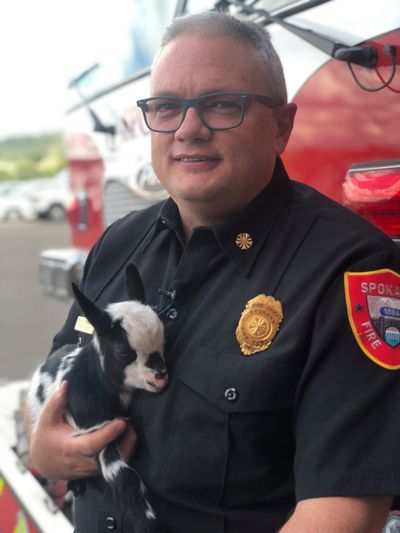Hungry goats eyed for use in fire prevention at Hangman Park

Goats will soon shuffle into Spokane’s Hangman Park, but this is no petting zoo.
The city plans to deploy a herd of goats to chew through vegetation and noxious weeds, creating a barrier between parkland and nearby residences that could reduce the risk of wildfire destroying personal property and, potentially, threatening human lives.
A herd of closely-watched goats will be shepherded into the park for a seven-day excursion in late September or early October; an exact date has not been set.
The use of goats in Hangman, which is adjacent to the city’s Creek at Qualchan Golf Course, is the first piece of a pilot program that will be expanded to three city parks in 2021, with the purpose the same in every park: mitigate the risk of fire while destroying noxious weeds. Proponents of the method say it’s more environmentally-friendly and cost-efficient to task goats with clearing vegetation – often in hard-to-reach areas – than use manual labor or expensive machinery.
A park was chosen to participate in the pilot program in each of the three city council districts. In addition to Hangman Park in the south council district, Meadowglen Park will represent the northwest and Minnehaha Park the northeast.
“It’s just kind of an opportunity this year to dip our toe in the water and start doing some of that community outreach so the citizens know what we’re doing, why we’re doing it, and get to know the goats,” said Giacobbe Byrd, legislative assistant to Councilwoman Lori Kinnear.
In Hangman Park this fall, the goats will be tasked with creating a “firebreak,” which is a firefighting term for a line devoid of flammable vegetation meant to stem a fire’s spread. They will be contained by an electric fence.
The plans were detailed during a meeting of the Spokane City Council’s Public Safety and Community Health Committee on Monday. Spokane Fire Chief Brian Schaeffer first introduced the concept to the City Council in January.
“It was a more limited scope project that we could accomplish in our limited window this year,” Byrd told the committee.
Never known to have a discerning palate, goats are also deployed to chew through noxious weeds.
Goats received praise and attention for their role in preventing a California wildfire from spreading to the Ronald Reagan Presidential Library and Museum, which had used more than 800 goats to fortify the property from fire earlier last year.
The city has contracted with Healing Hooves, a company based in Edwall, in Lincoln County, to carry out the work in Hangman Park. (Healing Hooves is co-owned by Craig and Sue Lani Madsen, who is a regular columnist for The Spokesman-Review.)
The council has dedicated $5,000 from its own budget this year to pay for the work at Hangman Park.
The expanded version in 2021 will rely on $21,000 from the Parks Department, which already has scaled back spending due to COVID-19. If the Parks Department cannot foot the bill, Byrd said the city may look to tap into the general fund.
“We’re looking to compare the cost of using goats with human labor and we’re also interested in seeing how quickly the weeds and brush grow back with goats compared to chemical treatments or human brush clearing,” Byrd told The Spokesman-Review in an email after the meeting. “We will also be looking to gauge community reception and buy-in to the project.”